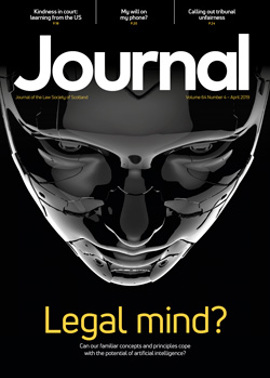Reflections from the Commission

The SLCC Consumer Panel published a new publication on 15 March to coincide with World Consumer Rights Day. The document – aimed at starting a discussion on vulnerability in legal services in Scotland – covers an area which is of special interest to the panel.
Last summer, the panel invited a number of interested parties to sit round the table and discuss what vulnerability looked like when we talk about legal services. It listened to the views of people who had used legal services, as well as to those who provide and those who regulate legal services in Scotland.
In the majority?
What was quickly realised was that vulnerability has a much wider meaning than many of us initially think.
We would all probably recognise some vulnerability characteristics which can impact upon the users of lots of different services. These might include things such as physical disability, age, having English as a second language, mental health issues and learning disabilities.
However, when looking specifically at legal services, the panel identified additional risk factors which arise from the very situations which cause people to go and see a lawyer. These could include, for example, situations around relationship breakdown, bereavement, domestic violence, immigration status, lack of liberty or release from prison. Indeed, the fact that the majority of legal transactions are what we would call “distress purchases” means that most clients are likely to be at risk of vulnerability to a certain extent – the fact that they need a lawyer’s help in the first place makes that the case.
Situations are important
The panel also agreed through discussions that vulnerability can be made up of a number of related factors which, when combined, can be paralysing for the individual concerned.
For example, a marriage breakdown can create further related risk factors around loss of income, or becoming a lone parent, or simply – unexpectedly – having to deal with living alone.
To that extent, the risk of vulnerability is very often about the situation a person finds themselves in, rather than about who that person is. That’s an important point to make, especially when we look at legal services.
Another important point is that vulnerability is, if you like, a moving target. Because someone is at risk of vulnerability at one point in time doesn’t mean that they always will be; or that where there is no risk today, that risk won’t arise tomorrow or next week. The risks of vulnerability can intensify, or diminish, over time.
Finally, and for me most importantly, is the knowledge that all of us have the potential to be vulnerable. This might be when placed in a situation where we feel belittled because of a real or perceived imbalance of power or knowledge, or when we find ourselves in a place where we have little or no control over what is going on. Both of these will very often apply to legal service users.
Discussion tool
The guidance which the panel has produced is intended as a discussion tool to make those in the wider legal environment in Scotland look at vulnerability through new – or at least newly cleaned – spectacles.
To help focus attention on consumers at risk of vulnerability, the panel poses questions to the legal regulators, the lawyers who provide our legal services, and those who deal with complaints when those services don’t meet the standards we expect.
The panel hopes that the profession will find its guidance useful, and that it helps improve awareness of, and adapt legal services to, the needs of those in oursociety who are at risk of vulnerability. The guide should also inform the current debate about the future of legal regulation by encouraging the design of models and regulation with user needs in mind.
The guidance, and an introductory video by one of the panel members, can be found on the Consumer Panel page of the SLCC’s website.
In this issue
- Time to promote shared care?
- Client medical records: a matter of right
- Search for the route to healing
- Rights after “same roof”
- Are you a qualified creditor?
- Reading for pleasure
- Opinion: Allan Jamieson
- Book reviews
- Profile: John Laughland
- President's column
- ScotLIS update
- People on the move
- Common law and artificial life
- FAIs: addressing the concerns
- Challenging times
- Shared humanity
- Cases of the paperless will
- How to manage your legal practice for success
- Fairness v Convenience
- Moorov then and now
- Personal licences: the uncertainty continues
- Is Airbnb use a planning matter?
- Insolvency Rules: a positive realignment
- IR35 compliance moves up the ladder
- “Best interests” in the balance
- Scottish Solicitors' Discipline Tribunal
- PSG tackles index-linked rent reviews
- Finding the right seat
- Public policy highlights
- Accredited paralegal update
- Events, and more, for members
- Accredited Paralegal Committee profile
- Second thoughts on executor declarations
- Client communication – a continuous journey
- Reflections from the Commission
- Love my tender
- Ask Ash






